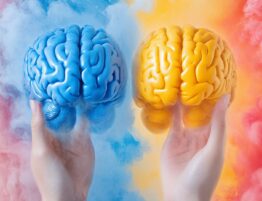Modern life offers many conveniences and opportunities. Comfort for each person has its own meaning and advantages. The most important thing for every person is health and its support. It’s crucial to take care of our nervous system. Communication is important for maintaining psychological health and the nervous system. We interact with many different types of people every day. Some people maintain close relationships with family and friends. Others often communicate with colleagues and people with whom they have something in common. Our brain is mainly affected by certain connections. It is very interesting and useful to know “how communication affects neurological health“.
This is an increasingly important topic. Without social connections, a person loses themselves and experiences decline in their overall health. Communication helps us reduce stress and tension. It also allows us to feel happy and needed. If it’s a person we love, we feel loved and cared for. Such communication has a positive effect on the nervous system and our brain. It is essential to understand that communication with others has a positive impact even on cognitive functions. During good communication, our brain releases oxytocin and serotonin. This means that we feel much happier and better than when we are alone.
How Communication Affects Neurological Health
The impact of social connections on brain health is enormous. Every day, we deal with and communicate with people, which is very useful. During these conversations, we communicate through various movements and gestures. Such communication often allows us to relax and relieve tension. In more business-like communication, our brains get busy as we start to think actively. The work of the brain continues even more during communication. Everyone should realize that communication has a positive effect on brain function. Cognitive functions improve, and mental activity becomes better as well. Practice shows that people who communicate more often have better-developed cognitive functions.
It is essential to understand how communication affects neurological health. The most important thing for a person is their neurological condition and health. Maintaining this health is the success of well-considered and correct decisions. Cognitive functions improve even during ordinary communication with other people. Our brains release special substances that make us feel happier. Such a good state always results in a person’s quality of life being successful. It is important to understand the types of communication and how they manifest themselves. Here are the main ones:
- Verbal communication. With such communication, our brain starts to work even better. The brain releases chemicals that enhance our thinking and creativity. At some points, we think critically and look for answers to questions. Such brain training is essential for overall neurological health. The impact of social connections on brain health is significant. During verbal communication, the brain is constantly working and developing. This method helps to improve cognitive functions and the overall functioning of the brain and nervous system.
- Non-verbal communication. During such communication, people can communicate more openly. When discussing something interesting, a person can gesture and show it all with their body. This approach is called non-verbal communication. Facial expressions and gestures are crucial for our brain functioning. Such actions during communication mean higher intellectual development for a person.
- Emotional communication. Understanding how communication affects neurological health is very important. We remain emotionally stable and healthy when we express our emotions. No wonder they say that keeping your feelings inside is very bad. Constant discussion of various issues and problem-solving is critical. Often, people express their emotions to their family and friends. Sometimes, people go to psychologists to better solve problems.
The Benefits of Social Support for Nervous System Health
There are many benefits of social support for nervous system health. They are aimed at improving a person’s overall psychological state and well-being. Social support is significant for a person who cares about their health. It is important to understand that any communication allows our brain to work actively. It is this work that has a positive effect on our general condition. When we communicate with people we like, we enjoy interacting with them. We also allow our brain to work so that we can relax. During communication, we can relieve stress and feel good and happy. Such a person can achieve better and greater success and always maintain confidence. Here is the main description of the benefits that affect our nervous system:
- One key benefit of social support for nervous system health is stress reduction. Close connection with other people who are especially pleasant to us allows us to reduce stress. When feeling stressed or down, cortisol is released, which is a harmful hormone. Positive communication that is aimed at raising a good mood reduces this cortisol. Accordingly, people who have close relationships on a regular basis have less stress.
- Also, constant communication helps to reduce various kinds of fear and uncertainty. During communication, we get good vibes and are in a good mood. We share experiences and accept them from the other person. Such communication allows us to avoid fear and always be protected. It is important to understand that communication plays a very important role in our lives and our overall psychological state.
- The benefits of social support for nervous system health also include recovery. The nervous system should always be healthy. It is they who influence the development and occurrence of various diseases. People who have a close social connection and communication often recover faster. These people often experience fewer complications during illness and recover more quickly. Such communication in general has a positive effect on our brain and its functioning. Communication allows us to improve our memory through constant brain activity.
Friendship’s Role in Cognitive Function
Friendship’s role in cognitive function is vital and necessary. Friendship plays a big role not only in an excellent psychological state but also in brain function. Such a close connection consists in the exchanging of positive energy between two people. People share their experiences with exciting stories and think about them. Such situations direct our brains to work and find ways to think about everything. Friendship is essential for the overall psychological state. There is also an improvement in cognitive state and cognitive functions. During such close communication, critical thinking and information exchange are activated. Friendship usually helps us relax, relieve stress, and feel comfortable. It is essential to understand how else it affects a person and friendship’s role in cognitive function:
- Friendship is close communication between two or more people and a good experience. People can often share a variety of information and interesting stories. Talking has a positive effect on our brains and improves their function. It is known that there is even an improvement in memory through such stories.
- One exciting example is interesting stories and anecdotes from your friends. These are the kinds of statements that are often remembered by our brain, which is a sign of its work. It strengthens cognitive abilities and maintains general condition. Such communication has a positive effect on our memory and awareness.
- Friendship’s role in cognitive function is vital and has many different ways. Friendship can be about more than just sharing information and having a good time. Often, friends join clubs and participate in group activities. Various training sessions help to improve our cognitive abilities and our mental activity. Friends can also exercise by going for walks in nature and going to the library.
Social Interactions and Dementia Risk Reduction
Social interactions and dementia risk reduction are closely intertwined. It is essential to understand that dementia often begins in the elderly. Various methods will help to avoid it or prolong its onset. One of the most pleasant and best ways is communication. Social connections play an essential role in the life of every person. As practice and research data show, communication is mandatory for older people. Such communication helps to avoid the onset of dementia and prolongs its delay. Data prove that people who have communication and friends in old age suffer less from dementia. This approach not only helps reduce dementia risk but also improves overall psychological and neurological health. It is necessary to understand the mechanisms underlying this connection. Since social interactions and dementia risk reduction are related, it is essential to understand the mechanisms. Here are the main ones:
- Mental activity. It is essential to understand that communication and friendship often improve mental activity. There is an improvement in cognitive functions and a person’s general state of well-being. Constant communication and receiving good emotions allow the brain to work better. Such work is closely related to aging, which becomes slower.
- Emotional support. It is important to understand that communication, especially in old age, allows you to maintain your emotional state. During communication, we share various stories, exchange positive impressions. Often, such communication has a positive effect on our brain. Such an experience is extremely important for our emotional state, especially if it is filled with joy.
- Physical activity. Social interactions and dementia risk reduction are closely related, and physical activity also has an impact on this. Physical activity is significant for our brain, especially with friends. This way of spending time allows not only improved physical health but also helps the working brain. Physical activity is generally good for our brain, and in combination with communication, it has an even better effect.
It is interesting to know various tips to support social interactions. These tips will enable all seniors to communicate with others. Participation in various community service, activities to help other people are useful. During such events, communication and interaction with other people takes place. Regular meetings with friends and relatives will help you relieve stress and communicate well.
Importance of Social Ties for Mental Health
The importance of social ties for mental health is paramount. It has long been known that social ties and communication have a positive effect on a person’s general condition. Not only do cognitive functions improve, but also the general condition of a person. People become less anxious and stressed. Communication allows you to feel like a real person and enjoy life. Also, this communication has a positive effect on the general condition and raises mood and emotional stability.
- The impact of loneliness. A person who does not communicate with the environment for several days may not notice the difference. However, sometimes loneliness allows you to gain a different perspective on yourself. Loneliness has a terrible effect on a person’s body and psychological state. When a person feels lonely, he faces stress and irritation. Often, a person can even fall into depression and not want to do anything. Loneliness is often characterized by constant anxiety, unstable emotions, and tension. The importance of social ties for mental health is paramount. Therefore, it is worth communicating with other people and taking time for yourself.
- Advantages of social connections. Social connections with different people have many advantages. If you take a family, such communication helps to establish emotional contact. They feel happier, more energized, and experience positive emotions. Communication with friends allows us to share exciting stories and get good experiences. Such experience over time helps to remember pleasant moments that have a positive effect on cognitive functions. In general, communication is quite beneficial for mental activity and brain activity. Such communication and friendship help a person to feel comfortable and needed.
How Social Connections Relieve Stress
It is essential to understand how social connections relieve stress. During communication, each person feels different emotions. Communicating with the right people allows us to reduce stress and lift our spirits. During communication, a stress-reducing hormone like oxytocin is released that reduces the level of stress. It has been proven that social communication has a great influence on a person’s emotional and physical state. Such communication has a positive effect on the functioning of the brain and the overall neurological condition. It is important to understand how to build better relationships and maintain connections. Here are some tips:
- Participate in various animal care activities. Volunteering will also be a good way of communication.
- Communicate more often with your family and friends. This approach will help you experience warmth and positive feelings.
- Taking up a hobby is another great way to build social connections and reduce stress. Arrange with friends to attend various events that will improve your emotional state. This approach will allow you to relax, relieve tension and stress, and feel truly happy.













Please, leave your review
Write a comment: